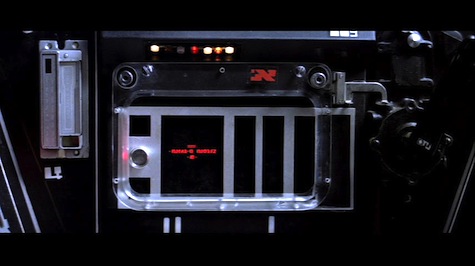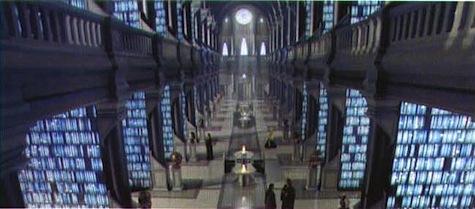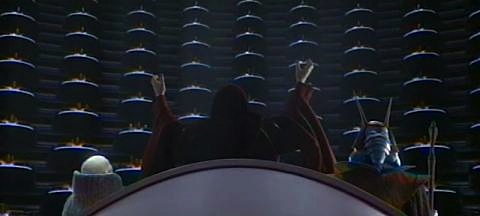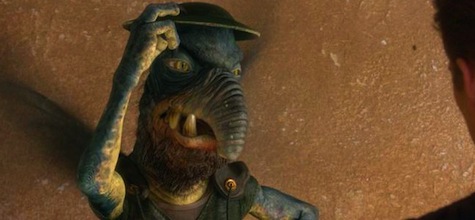Not once in any Star Wars movie does someone pick up a book or newspaper, magazine, literary journal, or chapbook handmade by an aspiring Jawa poet. If something is read by someone in Star Wars, it’s almost certainly off of a screen (and even then, maybe being translated by a droid), and it’s definitely not for entertainment purposes. As early as the 1990s-era expanded Star Wars books and comic books, we’re introduced to ancient Jedi “texts” called holocrons, which are basically talking holographic video recordings. Just how long has the Star Wars universe been reliant on fancy technology to transfer information as opposed to the written word? Is it possible that a good number of people in Star Wars are completely illiterate?
To be fair, finding a science fiction or fantasy universe richly populated with its own indigenous art—and more specifically, its own literature—is rare. As Lev Grossman has pointed out, “No one reads books in Narnia.” Harry Potter himself doesn’t really have a favorite novelist, and most of the stuff Tolkien’s Gandalf reads comes in the form of scrolls and prophecies…not exactly pleasure reading. Fantasy heroes don’t seem to read for pleasure very often, but usually you get the impression that they can read.
Very popular science fiction does a little bit better here, with characters on both Star Trek and Battlestar Galactica being pretty into novels and poetry. Notably, both of these universes have some kind of news media (as does Harry Potter.) And it’s in this lack of news media where the possibility of widespread illiteracy in the Star Wars galaxy starts to become more and more likely….
If you simply stick to the Star Wars films, there is no news media of any kind. Despite the fact that we see cameras circling around Queen/Senator Amidala in the Senate, they don’t seem to be actually feeding this information anywhere. Are they security cameras, like the ones that recorded Anakin killing little tiny Jedi kiddies? This theory achieves a little more weight when you consider that the conversation in The Phantom Menace Senate scene is all about how Queen Amidala can’t verify the existence of a coming invasion. She’s got no pictures, and stranger still, no reputable news source has even written about the blockade of Naboo. Even if we put forth that cameras in Star Wars are only for security and not for news, that still leaves the question of why there are no journalists. A possible answer: it’s because most people don’t read, which means that over time most people in this universe don’t ever learn to read.

“But wait!” you might be saying, “I remember seeing little pieces of text on the screen that Artoo sends to Luke to read. Also there is writing on the tractor beam controls, and people in the ships are looking at buttons with letters on them!” Well, I’d like to point out that even in the case of Luke Skywalker, these letters and pieces of writing are directly related to tasks. Pilots for the Empire are probably functionally literate, because they go through some kind of training academy. However, I think the visual evidence suggests a culture much more reliant upon technology and droids than is immediately apparent.
Uncle Owen needs a droid who can speak “bocce,” and then says something about the binary language of load lifters. Okay, so Uncle Owen needs a translator and someone to do math for him. This doesn’t sound like a guy who has gotten a suitable education. I suppose it’s possible that Luke picked up some reading here and there, but we don’t see any books or any evidence to suggest he’s a fluent reader. It seems like all the characters in Star Wars learn how to do is punch certain buttons to make their machines do what they need to do, and everything else is left up to droids.
In our own culture, pictograms have rapidly replaced words on traffic signs, restrooms, etc. The buttons being pressed by the Death Star control room workers might not even be letters. They might be pictograms representing different functions; functions like “death ray blast” and “trash compact.” Plus, how could those guys read anything in those helmets, anyway?

Attack of the Clones sees Obi-Wan Kenobi go to the Jedi Library, but again, this research facility seems less about books and more about pretty colors, interactive holographic maps, etc. The amount of actual reading even someone like Obi-Wan does is still limited. Now, I imagine Jedi can probably read and are taught to read, as are rich people like Princess Leia and Padme Amidala and Jimmy Smits. But everything in Star Wars is about video chat via holograms, or verbal communication through com-links. Nobody texts in Star Wars!
It seems like this society has slipped into a kind of highly functional illiteracy. Surely, for these cultures to progress and become spacefaring entities, they needed written language at some point. But now, the necessity to actually learn reading and writing is fading away. Those who know how to build and repair droids and computers probably have better jobs than those who can’t. This is why there seems to be so much poverty in Star Wars: widespread ignorance.
The idea of education becoming obsolete due to cultural changes isn’t without a science fiction precedent. In the Star Trek pilot “The Cage,” Vina speaks of a culture that “forgets how to repair the machines left behind by their ancestors.” I’m postulating that the same thing happened with literacy in the Star Wars galaxy. People stopped using the written word, because they didn’t need to, and it slipped away from being a commonly held skill.
And to bring up evidence from the expanded universe material a little more: in those stories even ancient Jedi records exist in the form of holograms. I’d say the switch to visual/audio communication from written communication has been underway for a long time in the Star Wars galaxy. It’s also possible people in Star Wars are simply not as imaginative as we are. Maybe the humans and aliens populating A Galaxy, Far, Far Away are totally boring people who simply used the written word for the purposes of getting their basic culture off the ground – for commerce only, rather than for reflection or pleasure.
The final nail in the coffin which proves widespread illiteracy is how fast stories of the Jedi mutate from a fact of everyday life into legend, seemingly overnight. This is because the average citizen of the galaxy in Star Wars receives his/her/its information orally, from stories told by spacers in bars, farmboys on arid planets, orphans in crime-ridden cities, etc. Without written documents, these stories easily become perverted and altered quickly. This is the same way Palpatine was able to take over in Revenge of the Sith. He simply said “the Jedi tried to kill me” and everyone was like, “okay.”

Padme points out that liberty dies “with thunderous applause,” but really their liberty is dying because most of them can’t read and are powerless and disenfranchised. In fact most of the surviving characters at the end of the prequels are the bad guys, and they can probably read. The Jedi seem to be the most educated people in the prequels, but that changes when they all get killed. This would be like a real life Empire going and burning down all the colleges and schools and killing all the teachers. The academy, the keepers of literacy would be gone. And once that happens, it’s easy for a tyrannical empire to take over, to control the information. Maybe Padme should have said “this is how literacy dies…”
But, what’s sad about Star Wars is that its inhabitants (save for our heroes) seem so complacent and lacking in imagination that this sort of thing was bound to happen in one way or another. In reality, if a whole culture relied exclusively on a group like the Jedi to not only guard justice and truth, but also be the only educated, literate people around, that culture would be seriously screwed up. Meanwhile, these people simply rely on their droids to do everything else.
Obi-Wan may have put a lightsaber in Luke’s hand, but really he and Qui-Gon should have been going around teaching people on poor planets to read years and years prior. After all, hokey religions and ancient weapons are no match for a good book in your hands.
This article originally appeared on Tor.com on October 3, 2012.
Ryan Britt is the author of Luke Skywalker Can’t Read, forthcoming from Plume Books in 2015. His writing appears with The New York Times, The Awl, SparkLife, Electric Lit, and elsewhere. He is a longtime contributor to Tor.com.











I’d have to watch Attack of the Clones more closely (something I am loath to do) to see if something similar exists in the movies, but in both Rebels and the Clone Wars cartoons, there are scenes in upscale nightclub/bars/cantinas that have TV newscasts going on, along with written crawls at the bottom, just like we have.
In fact, now that I’m thinking about it, so does The Phantom Menace… during the Podrace. I’m reasonably certain the Podrace was being broadcast via Holonet all across the sector, and they show bits and peices of the broadcast, along with crawls at the bottom of the screen with writing on it.
Oh well, nice theory.
Reviewed the podrace on YouTube. There are several shots of Shmi holding a portable tablet, which is broadcasting the race. It has a ticker at the bottom. So, there are definitely media outlets that broadcast things and use writing in the broadcasts. There are several shots of the broadcast production booth where the announcers are sitting. That is definitely a broadcast control room. I worked in one for 9 years. It has several screens that are sources for video feeds and graphics. Several of the graphic screens that would be mixed in to a broadcast also have writing on them.
Also, as I said, there is most definitely evidence of both broadcasting and reading in the two cartoon series, which are considered canonical on equal footing with the movies.
In Lord of the Ring it’s fairly clear that among humans and hobbits only the upper classes are literate. The Gaffer says that Sam is “taught his letters” by Bilbo “meaning no harm, and I hope no harm comes of it.” Only the royal family of the Rohirrim seem to be at all literate.
Might I point you to Hallis Saper in Starfighters of Adumar for EU news at least. Holodocumentarian trained in “sludgenews”.
I always got the idea that literacy probably differed much from planet to planet and from income to income, much like it does in real life. You probably don’t see much Jawa art, music, or books because its not in demand. Doesn’t mean they don’t make it, but for a species that partially communicates with smell….well, there aren’t many who would feel like collecting their art, I am guessing. With such vastly different species around the galaxy, some of one species’ art or music could even be DEADLY to another.
I am guessing there are huge swathes of the galaxy, especially out of the Core planets, that are largely illiterate and uneducated–in Basic. They may very well have their own language that they were taught, but those things don’t tend to be very important to mention when the galaxy needs saving. All in all, I see your point, but I think lack of mentioning literacy in Star Wars books and movies does not mean there isn’t any.
It seems to me to be either a) the idea of video replacing the written word; or b) a failure of world-building in Star Wars. Or both. Likely both.
Even if we grant there’s no writing, that doesn’t mean there are no recordings-we know for sure records exist in Star Wars (Help me, Obi-Wan, you’re my only hope), and it’s the fact that the written word is recorded-not that it’s “written”, that gives it its authority over spoken language. When Palpatine claims the Jedi tried to kill him (uh, didn’t they?) people take his side *because the script is badly written*. Holocrons exist because they sound cooler than newspapers, not as a part of a scathing critique on the part of Lucas of the dangers of illiteracy.
Over and above that, you have the problem of a vast galactic polyglot assemblage that greatly limits the utility of knowing how to read any particular language. You might learn just enough Basic to engage in commerce, while trying to perfect the local languages, of which there may be several. In a world with speaking droids and their presumably reliable Rosetta Stone protocols, you might save a bit of time scrapping the bit at the end where you translate Candide. We might also wonder whether the predilection for written art isn’t a kind of human peculiarity-the novel, as a container of artistic pretense, is kind of bizarre. Maybe everyone else in the universe sensibly sticks to making giant sculptures of their species’ genitals.
Holocrons are more interactive AI learning devices than simply recordings. Depending what is stored in them, they could have entire libraries worth of text in addition to images, 3d video, AI tutors…
Though I’m not sure how canon the various properties are any more.
Come to think of it, I don’t think anyone ever requires a toilet in Star Wars since we never see that happen either (except for one pack animal on Tatooine, as Jar Jar discovered.) Should we call this a “failure of world building” too? ;)
@8:
That’s true, I never thought of that!
People in Star Wars have evolved to the point where they process food so perfectly that anuses don’t exist anymore! Except for Lando, maybe. He’s definitely an a…
@8 Cecrow,
Ninja’ed me. But I also never see anyone brush their teeth. Have they conquered dental diseases? Perhaps they killed all the dentists and people have forgotten how to brush and floss.
Don’t mistake faulty world building for an opportunity at writing a dissertation on what we don’t see on screen.
The question becomes: so what?
We’ve identified several other forms for beings to communicate and capture ideas long-term. Who cares if that’s in the form of a book or a holo-recording?
Clearly the majority of characters presented in the movies have a trade, and with that we have to assume some form of education. There are highly complex societies that are still not only fixing the existing machines, but coming up with new X-wing variants, Death Stars, and assorted other technological marvels.
If there are communities in the Star Wars universe that ~may~ be illiterate, there’s been no case made that they are disenfranchised or otherwise negatively impacted by it in this very audio-visual galaxy.
If the dialogue is any indication, there may be a lot of bad reading within the Star Wars universe too. As the eloquent Mr. Ford said:
“You can type this s—, George, but you sure can’t say it!”
Whether you go by simply the movies, or go with that ‘extended’ universe (particular if you go by The Clone Wars), the one thing you can definitely say about the Empire is that a number of the plantery systems were agrarian, rural, did not seem to have much leisure, much less a great deal of culture – in the sense of artistic expression for it’s own right/expanding mind, conciousness, etc., type of cultural expression. Yes, the Night Sisters, as just one example, had all sorts of identity expressions and intrinsic and certainly historical artifacts, rituals, symbolism, etc., as did some of the other systems/planets in the Empire or the Galaxy, but that’s not what we are talking about when we speak of either basic literacy, or cultural/artistic literacy.
As well as the sources from the movies named above you mentioned the Expanded Universe, which has extensive use of Holonet and in Star Wars: Clone Wars, as well as in novels. Aurebesh is also a written language shown throughout the Star Wars universe.
“If the dialogue is any indication, there may be a lot of bad reading within the Star Wars universe too.” Maybe. Or perhaps the Star Wars universe has an entirely different cultural code for what constitutes “good literature.” I’d imagine that might happen in a universe constituted of so many different races interacting. Suppose we Earthlings encountered another world of beings with an entirely different literary tradition; where do we meet in the middle, that the whole known universe agrees on “good literature”? Multiply that for every additional race you see in Star Wars.
“Without written documents” or an oral history tradition. Cultures with oral history traditions manage to pass stories down the generations with amazing reliability.
But I’m amazed that nobody has picked up on the obvious parallels to today’s society (which I’m sure you intended).
Scott said:
Really? History has already shown that he who controls the mass-media controls the minds of the populace. People who don’t read are more easily led. And unfortunately the vast majority of people in today’s society don’t read (present company no doubt excepted, as I expect almost everybody who visits tor.com is a reader). Which makes us the Jedi, about to lose everything—including our ability to use the Force (ie, read)—to totalitarian regimes ostensibly installed for our own good.
Our global literacy rate is 82%, but I imagine the Star Wars galatic rate would, in fact, be far lower, given the sheer complexity of society, and the lack of a Prime Directive influenced system of non-interference. As for the Empire retconing galactic history – history is written by the victor, and we see educated people swallowing and regurgitating disinformation every day in the real world – effective disinformation relies on more than illiteracy alone.
There are several examples of basic (a simple alphabetic substitution cypher of the English language) text in the chase scene of Attack of the Clones, including on big screen monitors displaying various sporting events, a news ticker, and a variety of holographic advertisements.
Granted, Coruscant (where the chase takes place) is the center of civilization, so one would expect a high literacy rate, but similar to NYC, where we see high literacy in the advanced employment sector, we would likely also see that 80% of native high school graduates lack basic reading skills, and a wide range of immigrant residents would also likely be illiterate.
I’d suggest that Star Wars reflects reality in terms of illiteracy.
Exactly the point I was making. After all, I didn’t say we are illiterate, I said most of our populace doesn’t read.
Without written documents, these stories easily become perverted and altered quickly.
Why should a story recorded in a hologram be forgotten more quickly than one written down? In our own time media technology changes so fast that media from a few years ago often cannot be read with modern hardware any more, but if they have been using the same technology for a long time there is no reason it should be less lasting than written books.
You’re correct Birgit. Assuming that all writing is digital, it is just as open to manipulation as a hologram would be.
This is not true with print, however. Which I think is the (faulty) assumption of the original post. Once we completely reach a post-print society, any and all information can be corrupted and rewritten without our knowledge quite easily.
Already, Amazon can change the content of a book on your kindle without your knowledge. This happens all the time as technical manuals are updated. Its a feature, not a bug… but I can totall see it being abused in the future.
And even with your knowledge: authors, especially self-published ones, are getting more and more comfortable with making substantial changes to books and publishing new e-editions which sometimes bear little resemblance to the original.
Why do you think there’s a faulty assumption in the original post, though?
OP:
Without written documents. Its not the writing of such documents, its the typesetting, printing and distribution of such documents that keep stories from being perverted and manipulated. But such protection is not available in a world where print is probably several thousand millenia out of fashion, and everyone’s devices are connected to a halonet that is 10,000 years old and controlled by a small group of people.
That’s what I think is the faulty assumption of the OP.
Another commentor is right, though. Some cultures have a very strong oral tradition, and there is evidence that those oral histories have remained essentially unchanged for millenia. A strong oral history tradition is much more reliable against tampering than what the transmission of knowledge is likely to become in our not so distant future.
Just imagine a world where all history textbooks are digital, and governments make the curriculum for all grade school students, and parents aren’t actively involved in their child’s education. Its a really, really small step from focusing on a favorable (to the regime) view of things, to censorship of opposing thought in our texts, to outright fabrication of history. 200 years into such a system, who would have any clue what really happened and what was fabricated?
Thanks. I agree it’s the whole process of writing and publishing the work that makes it more set in stone, but I really thought that was the point Ryan was making.
The person making the point about oral traditions was me :-)
@25: Ha! Oops.
One important clarification–its mass printing that makes it more “set in stone”. Like you said, nowadays, publishers lease you the ebook, and can make changes to the text without anyone knowing. You may not have a previous version to fact check against.
This is one of many arguments against DRM. Caching a local copy of an ebook allows versions to be preserved.